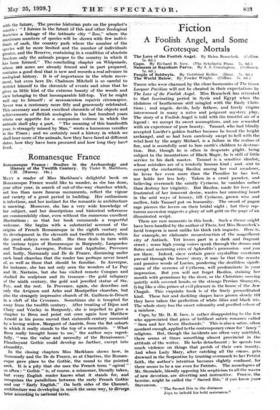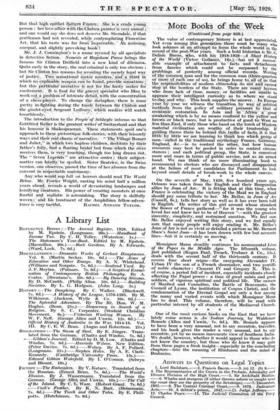Fiction
A Foolish Angel, and Some Grotesque Mortals THOSE who were charmed by the clear harmonies of The Green Lacquer Fatilion will not be cheated in their expectations by The Love of the Foolish Angel. Miss Beauclerk has retreated to that fascinating period in Syria and Egypt when the idolators of heathenesse still mingled with the Early Chris- tians ; and angels, devils, holy fathers, and lovely Virgins intercrossed in many a naive and poignant mystery play. The story of- a Foolish Angel is told with the trustful air of a legend : we accept its sweet assumptions, and are rewarded with an experience of pure beauty. Tamael, who had blindly accepted Lucifer's golden feather because he loved the bright archangel, and so had been carelessly swept to hell with the rebel host by the angry Michael, is a failure in the realms of fire, and is scornfully sent to lure earth's children to destruc- tion. But, though he is often in desperate plight, being subject to the incantations of Black Magic, he is still of little service to his dark master. Tamael is a sensitive idealist, whose mistakes are of a tenderly human kind ; and, sent to corrupt the enchanting Basilea among her cool meadows, he loves her even more than the Paradise he has lost, nor holds her less holy. Taken in a cruel paradox, and believing overmuch the saintly Cyriacus, he vanishes rather than destroy her virginity. But Basilea, made for love, and frustrated of her innocent desire, wastes her unrestinj' heart in the arid ways of luxury, till Cyriacus, grown wise and mellow, bids Tamael put on humanity. The sword of pagan rage pierces the lovers on their bridal night ; but their rap- turous ascension suggests a glory of soft gold on the page of an illuminated script.
There are rare moments in this book. Such a theme might have been handled by the author of Thais, but Miss Beauclerk's lucid tempera is most unlike his thick rich impasto. Here is, for example, no elaborate reconstruction of the magnificent city of Antioch. Yet lovers part in a dark and fragrant street ; some high young voices speak through the drums and flutes and mourning cries of Aphrodite's procession—and you are there. Indeed, since' certain grave crystalline overtones prevail through the lovers' story, it may be that the remote and pensive words of Lucius, pondering the deathless signifi- cance of the sorrows of Cytherea, will predominate in your impression. But you will not forget Basilea, staining her mouth with geraniums by the river, or the Christians moving quietly with covered heads, or the strange Persian Shamyris, lying like a slim prince at evil pleasure in the house of the Jew Chagab. This exquisite book is of the finely premeditated kind. These fair and darkling shapes have grown slowly till they have taken the perfection of white lilies and black iris. The whole story has the sweet solemnity and purified colour of
a rainbow.
Capo, by Mr. R. B. Ince, is rather disappointing to the few
who appreciated that piece of brilliant satiric romance called " Sara and her Seven Husbands." This is also a satire. often mordant enough, applied to the contemporary craze for" fancy" religions. But, though the incidents are often very mirthful, there seems at times something almost provincial in the attitude of the writer. He lacks detachment ; he spends too much violence on things that perish of their own inanity. And when Lady Mary, after catching all the crazes. gets drowned in the Serpentine by trusting overmuch to her Petrist faith, the author's intention becomes slightly confused, for there seems to be a use even for Petrists. The monologues of Mr. Sterndale, blandly opposing his scepticism to all the waves of new devotion, are diverting and instructive; Franc, the heroine, might be called the " Sacred Ibis," if you know you'
Stevenson. " The Sacred Ibis in the distance Joys to behold his bold resistance."
But that high epithet flatters France.: She is a crude YoUng person ; her leire:affair witlithtChelsea painter is very unreal and one would say she does not deserVe Mr. Stemdale, if that gentleman had not revealed, while contemplating Florentine Art, that his taste was far frod'Impeocable. - ATn am-Using, unequal, and slightly provoking book'l Mr. J. J. Connington's is a name revered. by all specialists in detective fiction. Nemesis at 'Itarinham` Parva brings the famous Sir Clinton Driffield -into a new kind of dilemma. Quite early in the story, the real criminal is only too obvious ; but Sir Clinton has reasons for avoiding the meretjr., legal way of justice. Two 'sensational motor_ murders,' dil.:.ti.,third in which no explicable weapon can be found, pioVide.aelisatiOns but this Paiticulai narrative Is net 'for the ieekei for excitement. It is food for the ,gas-er_sp‘ ecialist who likes to work mita yroblenr of intricate detail, with the concentration of a chess-player. To change the metaphor ,' there is some' pretty in-fighting dining the tuisle betWeen Sir Chilton and the gimlet-eyed, Sergeant Ledbury which readers will watch breathlessly. ' .• The introduetion to-,the People of Seldwyla informs us that Gottfried Keller is the greatest wiltei.of-SWitzerland and that his huniniir -ShakesPearean. These statements spoil one's apprOnch to these pictureaque folsterieS,-witlytheirleisurelY ways and their real charm of narrative. " TfieVillagi Rome° and Juliet," in:Which two hapless children, destitute by their father's folly, find a floating bridal bed from -which the river receives them, is very touching, though too king drawn out The " Seven' Legends' " are attractive contesi their subject- matter can hardly- be Spoiled: Sister Beatriee',. in the Si4iss version, one observes; passed the time of her absence from the convent in're-slieetable matrimony: Any who would sup full on horrors should read The World Below. Mr. Fowler Wright, .casting his mind half a million years ahead, reveals a world of devastating landscapes and terrifying creatures. His power of creating monsters at once fearful and realistic is astonishing. The story is skilfully woven; ;aid his treatment of the Amphibian fellow-adven-









































 Previous page
Previous page